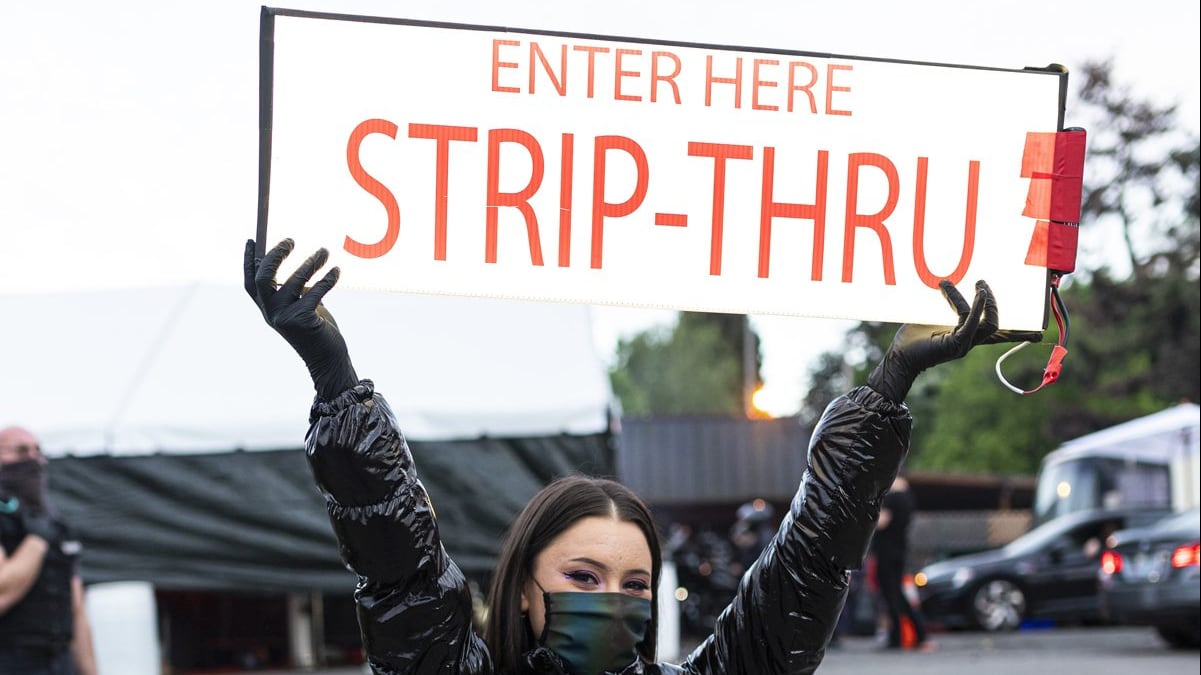For much of the 20th century, the automobile was an unmistakable symbol of freedom.
More recently, though, our cars have felt less like machines of liberation and instead a form of confinement—laps logged while traveling from home to work, and work to home, in a cage of steel and glass.
But in the new reality constricted by a deadly pandemic, where our jobs, schools and social lives have been compressed into our living quarters, we've started to look at those vehicles with fresh eyes.
Whether it's taking a spin through a pop-up strip club or reembracing the drive-in theater, Oregon is improvising ways to satisfy our innate desire to socialize with others—and right now, the safest way to do that is from behind the wheel.

Lucky Devil Lounge Food 2 Go-Go
On a recent Friday night, a spectacle unfolded in the parking lot of Lucky Devil Lounge.
Within the confines of a tent set up beside the strip club on Southeast Powell Boulevard, four dancers swiveled around poles set up on makeshift platforms, wearing slightly more than they normally do on the venue's stage: pasties, fishnets, short shorts and spring 2020's hottest accessories—face masks and rubber gloves.
A line of vehicles, meanwhile, passed between them. A Honda Fit filled with young women in beanies bounced in place as the DJ spun a soundtrack. Two people in Russian-style fur hats perched in the back of a convertible Mercedes, like princesses readying their parade waves. From a freshly waxed Corvette to burly full-sized trucks, you might have confused the scene with an old-fashioned cruise-in—or some sort of defunct car wash converted into a post-apocalyptic disco.
"This is the future, right here!" owner Shon Boulden bellowed over the music.
Lucky Devil is quickly becoming known for its creative pivots to keep business going during the pandemic. First, there was the club's food delivery service, which made national headlines. Now, you can also come to the club to pick up your steak bites and chicken strips—and get a slightly longer show than you would on your stoop. Tip jars are attached to metal barricades in front of the platforms, though dancers are also armed with long pincers to grab bills directly from customers' hands.
After two songs in the tent, drivers are ushered out the other side of the parking lot where their order is waiting—and, as two men who drove from McMinnville specifically for the diversion learned, no, you cannot hang out and eat your food there. But really, the meal is just a pleasant perk.
"So many people are just excited to see other people," Boulden says. "Everyone just needs this."
And apparently, so do dogs. At one point, two bouncers lifted the tent to provide just enough clearance for a bulky camper van to roll inside. As the dancers on either side gyrated and spun, a white pooch stuck its head out the passenger window and cocked it to one side.
"Welcome to the show!" the DJ announced. "I love your dog! He knows what's up." ANDI PREWITT.

The A-To-Zoo
The Oregon Zoo is closed, and one can only watch cat videos for so long before craving actual communion with nature.
But if you want to see a dugong or a narwhal or a fairy penguin, there is a place—a front yard in the North Portland neighborhood of Vernon.
Don't worry, this isn't a Tiger King-style attraction. The animals are all made of wood.
Former preschool teacher-turned-full-time illustrator Mike Bennett found an audience in 2019, when his plywood carvings of well-known memes and cartoons went viral on Portland social media. These days, he's busy working 12-hour shifts on his latest installation, which he calls the A to Zoo—26 plywood animals, one for every letter of the alphabet.
Related: This Portland Artist Is Blowing Up Online For Bringing Popular Memes and Cartoon Characters Into the Three-Dimensional World.
The idea for a drive-by zoo took shape when a dozen wood-cut characters were stolen from his yard in the middle of the night. Disheartened, he brought the rest of his work inside for safekeeping. Then his neighbors began reaching out, wanting to know when his creations would reappear.
"I don't think I quite realized to what level families relied on this stuff," he says.
So far, he's created over 16 zoo animals, but don't expect your typical lions, tigers and bears. "While those animals are incredibly important and amazing, I really wanted to focus on some lesser-known animals," Bennett says. "I'm trying to throw some curveballs, but I've got some classics in there, too."
Bennett prefers to keep his address obscure, hoping visitors will explore the city to figure it out on their own. But if you miss this round, Bennett notes more is on the way. He says the sequel will be A to Zoo Two: Extinct, featuring dinosaurs, megafauna and ice age mammals.
"And if we're still in quarantine," he adds, "I'm already designing my third one, which will feature cryptid and mythological animals." CAMERON VIGLIOTTA.

Monty, the Agave Montana
Lance Wright is tired of talking about the rare plant currently flowering in his yard. No, literally—so many people have visited his home in Southeast Portland to ask about it, he briefly lost his voice.
The interest is understandable. According to the retired city of Portland horticulturist, the 20-foot-tall agave montana could be the first of its species to bloom in the Pacific Northwest. He calls the plant Monty, and its status as a pandemic tourist attraction is warranted. He's a looker, with crimson flowers blossoming from flourishing branches emerging from a gray-blue bulb.
Last Friday alone, Wright counted over 300 visitors to his garden. To save his voice, he tied an FAQ sheet to Monty's stalk. He's installed bamboo poles to keep visitors from wandering into Monty's spiky leaves and from trampling his other plants.
"This has been like an open garden every day, with people I don't know and can't control," Wright says. "You just hope people don't start pulling on things."
Wright's full garden has over 500 exotic plant species. His sidewalk alone includes Monty, an iris bed, a smaller agave of another species, and two towers of jewels—brushes of pink flowers with green tendrils native only to the Canary Island of Tenerife.
He says with the right attention, any of the tropical or desert plants in his garden can grow anywhere in Portland, and Wright hopes Monty inspires people to plant something weird to increase the city's biodiversity.
"There's nothing in this parking strip that's so weird that it couldn't grow anywhere in Southeast Portland," he says, "or in much of Portland." ANDREW JANKOWSKI.

The Milton-Freewater Drive-In
On the first weekend of every April, Mike Spiess opens one of Oregon's only remaining drive-in movie theaters on a 4-acre plot in the town of Milton-Freewater. But this year, instead of kicking off the season with al fresco double screenings, Spiess hosted a pop-up takeout restaurant, two church services and a wedding.
He considers all that a dress rehearsal for getting the projector back up and running.
"We were approved to open April 3, but we thought hard about that," says Spiess, whose family has been running the drive-in since 1961. "I said, 'Let's go food only for the first couple weekends and see what it's like. We can practice our social distancing.' After we got through [Easter] weekend, my wife and I thought, OK, let's try this."
Three weeks ago, people in Northeast Oregon left their homes for the evening to bed down in the back of pickups and open hatchbacks to watch Harrison Ford and his CGI canine companion in The Call of the Wild.
"It's working out well," says Spiess. "I think we're providing an opportunity for people to do something, a family activity that's kinda normal, and doing it in a unique way."
Not everything is exactly "normal," though.
For one thing, guests must stay in their cars—no sprawling out in lawn chairs or blankets. Drive-in workers wield a 7-foot segment of PVC pipe to ensure nobody gets too close to one another.
And whereas a busy weekend in the past might see anywhere from 250 to 300 cars parked in front of the giant screen, Spiess will now take only somewhere in the range of 100 to 125. Not that he's turning cars away—the largest turnout has been 80 vehicles on the Friday he reopened.
But that doesn't mean there isn't a demand. Spiess originally launched the COVID-19 version of the theater with an online reservation system, which booked within minutes and drew inquiries from as far away as Portland, Eugene and Yakima, Wash.
Many don't realize how far they'll have to travel to watch the latest Pixar flick until Spiess mentions the drive time. He's since switched to a first-come, first-served model—but he won't turn valley-dwellers away if they happen to make the trip.
"We're not trying to get people coming here from a distance. That's not what anybody's supposed to be doing right now," Spiess says. "Now, if a guy's sitting in his car in line and I'm walking down there saying, 'Hey, we're full,' and they say they came from Portland, I'll find a way to get them in there. I'm not gonna tell them to turn around and go home." ANDI PREWITT.



